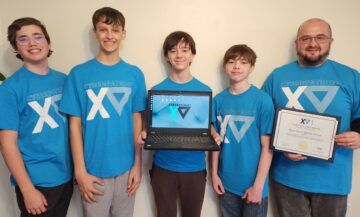Cyber Successes
 Four Ryan Gloyer Middle School (RGMS) students earned top recognition at the CyberPatriot’s National Youth Cyber Defense Competition, the world’s largest cybersecurity challenge.
Four Ryan Gloyer Middle School (RGMS) students earned top recognition at the CyberPatriot’s National Youth Cyber Defense Competition, the world’s largest cybersecurity challenge.
The T-Rollers team of RGMS eighth graders earned the most points of any middle school in Pennsylvania over the first two rounds. They advanced to the state round of the competition placing second overall. The team was also the only middle school in the state to qualify for the National Semifinal Round after scoring in the top third of the nation based on their performance in the first three rounds.
Through a series of six-hour online competition rounds, the team was given a set of virtual operating systems and tasked with finding and fixing cybersecurity vulnerabilities while maintaining critical services. Using a proprietary competition system, teams were scored on how secure they make the system.
The T-Rollers team, comprised of Albert Pimenov, Sidney Newton, Parker Budney and Nolan Minder, had a successful inaugural season under the direction of Greg Smolinski, an RGMS gifted support teacher and team advisor.
“The four young men worked well as a team, supporting each other when stuck on a challenging problem. Their knowledge of Windows 10, Server 19, and Linux for people their age is impressive,” said Mr. Smolinski. “They definitely taught me a few new things about the inner workings of these operating systems.”
The students competed in the Semifinal Round on January 21 and finished the season in 200th place at the nationwide Middle School Competition.
The Cyber Defense Competition challenges teams of high school and middle school students to find and fix cybersecurity vulnerabilities in virtual operating systems. Teams are put in the position of newly hired IT professionals tasked with managing the network of a small company.
“As the competition rounds progressed, it became apparent how many different complex threats can be used against computer networks. The Air Force Association sponsors CyberPatriot because they see that need to train students to help defend our country’s digital assets through logic, knowledge, thought, and commitment,” Mr. Smolinski added.

